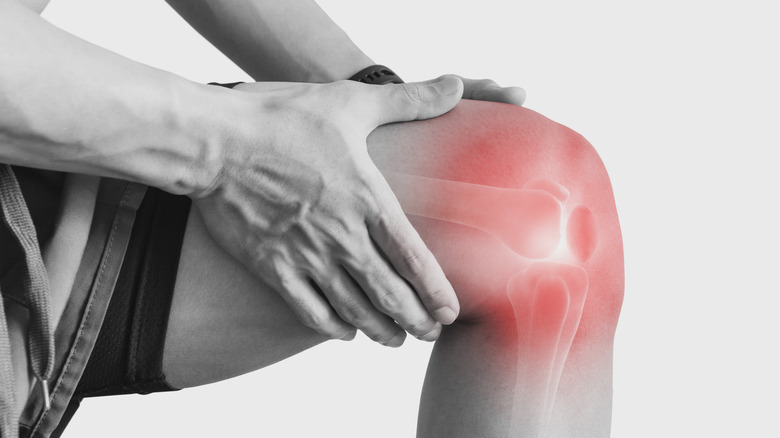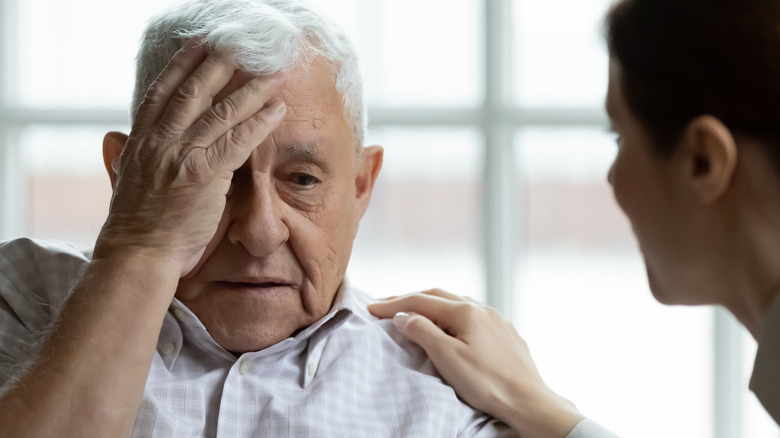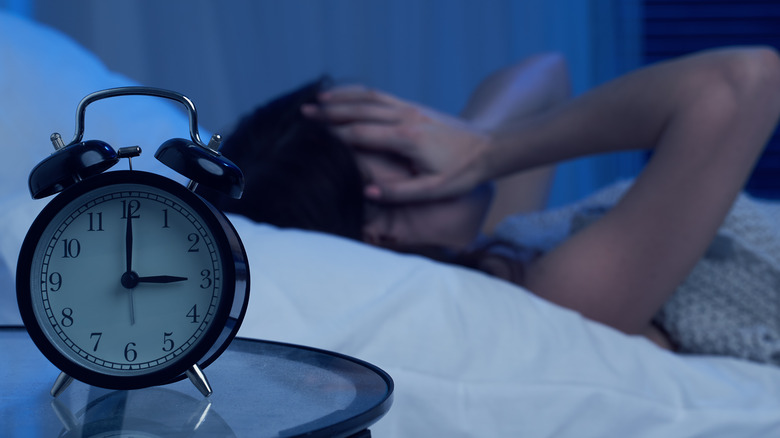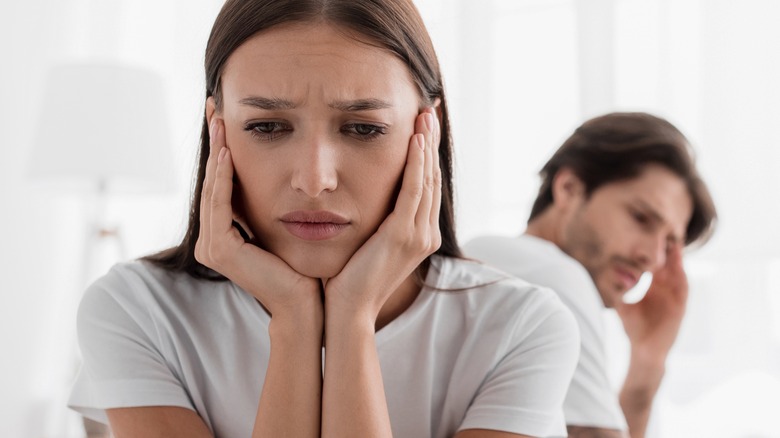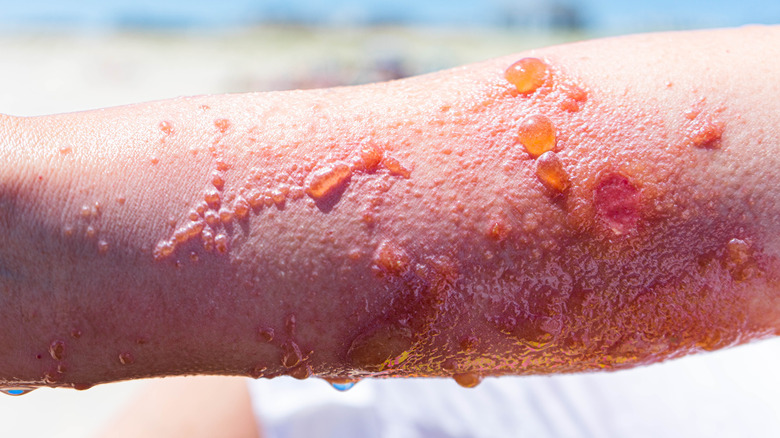What Happens To Your Body When You Stop Taking Steroids
Since 1948, dermatologists, rheumatologists, oncologists, and just about every other specialty have relied on steroids to ease side effects of medical treatment such as chemotherapy and control certain chronic conditions (via American Family Physician). Steroids such as prednisone can treat a wide array of ailments, from a bad case of poison ivy to chronic diseases such as asthma and rheumatoid arthritis. But this long-standing miracle drug also comes with a hefty list of side effects, according to MedlinePlus.
At times, you may want to stop taking steroids due to one (or several) unwanted side effects. Sleep disturbance, mood changes, acne, bruising, and fatigue from steroid use can be disturbing reactions that most want to avoid. For others, once you begin to feel better, you may not finish your prescribed course of steroids or safely wean off this medication, says MedlinePlus.
Either way, stopping steroids abruptly or not following a prescribed plan to decrease the dosage gradually can lead to steroid withdrawal. Steroid withdrawal can be dangerous and uncomfortable, and is to be avoided (per Healthline). Even if you take your steroids as directed, you may still feel some of the negative aspects of withdrawing from this medication.
What is steroid withdrawal?
Healthline explains that steroids, otherwise termed corticosteroids, mimic an essential hormone manufactured in our adrenal glands called cortisol. When taking steroids, our adrenal glands slow down on cortisol production. Essentially, the body no longer needs to create cortisol like it normally does, with steroids taking the place of this essential hormone.
However, when you stop taking steroids abruptly, your adrenal glands do not automatically kick in and begin making cortisol once again. This restart of cortisol production is a gradual process that your body needs to get used to. Even if you slowly wean yourself off your steroids, you may have withdrawal symptoms, although not as severe as those who suddenly cease taking their steroid medication.
Since cortisol affects just about every function in the body (such as blood pressure, heart rate, and reaction to stress), abruptly stopping steroids can wreak havoc in your body on many levels (via Healthline). Here's what happens to your body when you stop taking steroids.
You may feel weak and tired if you stop taking steroids
Fatigue can be a drag on any given day. Add steroid withdrawal, and your tiredness may reach a new level of exhaustion.
Severe fatigue is a side effect of stopping steroids that may last for weeks up to an entire year, depending on how long you have been taking steroids (via Healthline). For those who have tapered slowly and according to their physician's instruction, the length of recovery from side effects such as fatigue should not be as long.
In addition, you may feel weak as a kitten after you stop taking steroids. A clinical study showed that those taking steroids for less than a month could experience muscle weakness, especially in women over 60. This side effect may become more prevalent during withdrawal, as you no longer have steroids to boost your energy and strength. A gradual reduction in your steroids will allow time for your adrenals to "wake up" and gradually start producing the cortisol that your body, including your muscles, needs to function optimally (per the Mayo Clinic).
Expect stomach distress when stopping steroids
For many, taking steroids can cause stomach upset. The Mayo Clinic advises timing your medication with food to control this mild side effect.
However, if you abruptly stop taking your steroid, you may experience severe nausea, vomiting, and diarrhea. Steroid use decreases vital cortisol production, and the adrenal glands (which produce cortisol) help to promote healthy gastrointestinal functioning (via the Endocrine Society). When you stop taking steroids, the absence of cortisol will signal your gastrointestinal system that this vital hormone is missing, and your innards will revolt in protest (per the Mayo Clinic).
Gradually weaning off the drug is advised to decrease the intensity of stomach problems associated with steroid treatment. Your physician will outline a tapering plan designed to safely reduce your medication over time to minimize withdrawal symptoms. The exact weaning plan will differ from person to person, depending on how long you have been on steroids and the dosage you have been taking, explains the Mayo Clinic.
Stopping steroids may cause decreased appetite and weight loss
Although those taking steroids are at risk of packing on the pounds, the exact opposite can occur if you stop your steroid treatment too quickly. When stopping steroids, decreased appetite and weight loss are other common issues that may surface (via MedicineNet).
As the Cleveland Clinic explains, our metabolic system, controlled by your adrenal glands, may cease to function adequately when you stop taking steroids. Your weight can be affected when steroid use interferes with your metabolism. In addition, hormones produced in the adrenal glands control our desire to eat. When steroids are stopped, a loss of appetite may result in unintentional weight loss (per MedicineNet).
To make matters worse, having an upset stomach when discontinuing steroids can further decrease your appetite and lead to weight loss. Even mood changes associated with steroid use (such as depression and anxiety) can contribute to reduced appetite as you withdraw from the drug (via Medicinenet). The combination of these factors adds up to a poor appetite that, over time, can cause an incidental drop in weight.
Stopping steroids may cause body aches and joint pain
For those with painful stiffness and joint discomfort, steroid treatment can bring welcome relief. A prescription for long-term steroids is standard for those suffering from rheumatoid arthritis and lupus (per the Cleveland Clinic), two conditions in which joint aches can be debilitating.
Although steroids such as prednisone can be a remedy for many arthritic complaints (per the Rheumatoid Arthritis Support Network), stopping steroids may cause the exact pain the steroids initially intended to treat. According to Healthline, withdrawal from steroids often produces joint pain and general body aches. This makes it challenging at times for doctors to determine if the patient is experiencing a flare in their condition, or if the increased pain and stiffness is a side effect of withdrawal.
This phenomenon holds true for all forms of steroid use. Corticosteroid nasal sprays, asthma inhalers, eye drops and steroid tablets, suspensions, and creams can all lead to withdrawal symptoms when one stops using them, according to Drugs.com. However, oral steroids hold the most risk of eliciting a negative withdrawal response (e.g., body aches and pains). To avoid any undesirable reactions when stopping your steroid treatment, it is best to consult your prescribing physician when discontinuing any type of steroid medication.
Dangerous drops in blood pressure can occur if you stop taking steroids abruptly
The Cleveland Clinic explains that one of the primary functions of the adrenal glands is to regulate blood pressure. When steroids interfere with the functioning of your adrenals, blood pressure fluctuations can occur. It is common while taking prednisone and other steroids for blood pressure to rise. If you withdraw from prednisone abruptly, your blood pressure can take a dangerous dive (via Medical News Today).
Most of the side effects of steroid withdrawal are not life-threatening. However, hypotension (low blood pressure) can lead to dizziness and fainting, which can be quite concerning (via Healthline). This troubling symptom can last from a few days to months after stopping your steroids. Standing up quickly or for long periods can be challenging for those experiencing low blood pressure. Blood pressure tends to drop when you perform these moves, putting you at a greater risk of fainting. It is best to consult your doctor if you are experiencing this side effect after stopping your steroids.
Expect mood swings when stopping steroids
Everyone experiences mood swings at one time or another. Changing moods and frequent irritability can disrupt your life and those around you (per Psychcentral). To live a peaceful existence, most try to avoid circumstances that can lead to a negative emotional state.
For those withdrawing from steroids, controlling wild emotions and moody behavior may be very challenging. You may feel exuberant at one moment, and be crying or enraged the next. WebMD warns that steroid withdrawal can cause some scary psychological side effects such as depression, delirium, mania, or anxiety.
A study in BMJ Open explains that some behavioral changes such as depression and mania may actually be from changes to the brain that have been attributed to long-term steroid use. While withdrawing from steroids, your body will need time to adjust to the transition from steroids to cortisol taking over, causing a psychological disturbance as your body gets used to the shift. Fortunately, this more troubling side effect of coming off steroids is temporary, as are the rest of the adverse reactions. Working in conjunction with your doctor can help you through this phase of withdrawal. According to the Mayo Clinic, if you are experiencing severe psychological distress (such as suicidal thoughts or wanting to hurt others), seek immediate help.
If you or someone you know needs help with mental health, please contact the Crisis Text Line by texting HOME to 741741, call the National Alliance on Mental Illness helpline at 1-800-950-NAMI (6264), or visit the National Institute of Mental Health website.
When you stop steroids, you may get a terrible headache
There are many types of headaches, such as those that come with hormonal and weather changes and those caused by stress (Healthline). We all have dealt with the discomfort associated with migraines or one kind of headache or another.
With that said, a headache associated with steroid withdrawal may become quite distressing. This common side effect when stopping steroids may be fallout from other negative problems that come from steroid cessation, such as sleep disturbances, fluctuating blood pressure, stress on your adrenal glands, and low blood sugar. These combined factors can all contribute to a headache that is hard to cure quickly, according to WebMD.
WebMD points out that even if you taper slowly off your steroids, you can still experience mild side effects such as headaches. Rapid withdrawal of steroids can elicit a more severe headache. A steroid-induced headache should not be treated with over-the-counter medication, unless directed by your physician.
You may have trouble sleeping after you stop taking steroids
Nothing feels worse than a night of tossing and turning with very little sleep. The National Heart, Lung, and Blood Institute reminds us that a good night's rest is important to feel refreshed and for your body to rejuvenate itself. For those taking steroids, sleep may elude you. Moreover, it is well noted that steroids cause sleep disruption. An NIH study backs this up; after studying patients in the ICU who are being treated with steroids, it was determined that steroid therapy leads to sleep deprivation in those studied.
When stopping steroids, your body may not be not ready to immediately begin producing cortisol, which is an important sleep-regulating hormone. As cortisol is responsible for the sleep-wake cycle (via the Cleveland Clinic), the lack of cortisol when withdrawing may cause wakeful nights and sleepy days. Your sleep is intended to follow an established pattern, called a circadian rhythm. You need the appropriate amount of cortisol to be secreted at specific times to keep this pattern in the appropriate day and night sleep rhythm (per Healthline). Once steroids have been stopped and cortisol is not being produced like it should, sleep can temporarily become a nightmare.
You may get a fever when you stop taking steroids
A fever is your body's natural response to combat germs when you have an infection, and is one of the ways your body signals that something is wrong (via Tylenol). Interestingly, one of the more surprising side effects of steroid withdrawal is fever. However, fevers resulting from steroid withdrawal are not caused by an infection.
When steroids are abruptly stopped, you may develop a condition called withdrawal syndrome. One symptom of this syndrome is fever (via the Hospital for Special Surgery). Since the adrenal glands affect just about every body system, your nervous system, which helps to regulate body temperature (per the National Center for Biotechnology Information), may be affected by the sudden withdrawal of steroids, and low-grade fever may develop. According to Vicks, a low-grade fever is between 99.5 degrees and 100.3 degrees Fahrenheit.
If you develop fever and chills and have recently stopped taking steroids, it is crucial to call your doctor to rule out a steroid-induced fever. Make sure to remind your provider that you have stopped your steroid treatment.
Your libido may be affected when you stop taking steroids
If you have ever taken steroids, you may recall a surge in your sex drive (per eHealthMe). As adrenal glands are part of the endocrine system that controls sexual functioning (via the Cleveland Clinic), it makes sense that steroids may cause some disruption to your sex drive, whether positive or negative.
Steroids tend to interfere with and confuse your adrenal glands. Your sex hormones can be impacted by adrenal gland problems from steroid withdrawal, wreaking havoc on your libido. Rapid withdrawal from steroids may decrease your sex drive due to unstable adrenal function associated with withdrawal, according to a study on prednisone and libido disorder in eHealthMe.
Factor in depression, stomach upset, sleep disturbance, and generally not feeling well from steroid withdrawal, and your libido may sink to new lows. Fortunately, you can get back on track in the bedroom as your adrenals begin to secrete cortisol over time.
You may feel dizzy when you stop taking steroids
Feeling lightheaded (vertigo) can be another side effect of steroid withdrawal. Vertigo can be particularly concerning, as ongoing dizziness may impact all aspects of your life, making it difficult to work, exercise, or even care for your family. Those of you who have experienced dizziness know that you need to be careful when a woozy spell hits. It is easy to fall and get injured when feeling unsteady or faint. But what causes dizziness, and why does stopping steroids contribute to this concerning problem?
One of the leading causes of dizziness is low blood pressure. Your blood pressure may drop when you cease steroid treatment, more so if you stop suddenly (per Medical News Today). As your blood pressure may be lower than normal after stopping steroids, you must be more careful when standing up quickly. According to the Mayo Clinic, this type of low blood pressure is called orthostatic hypotension. Low blood pressure should correct itself with time as your adrenal glands begin to produce more cortisol, thus self-regulating your blood pressure once again.
Your original condition may come back with a vengeance
The Mayo Clinic warns that if you stop taking prednisone suddenly or before your course of treatment is finished, you risk a rapid and worsening flare-up of the original condition for which you were being treated with steroids. Hence, it is better to taper down slowly, even over the course of several months, to avoid a "rebound" case of your condition.
Dealing with a flare-up from an improperly treated condition due to stopping steroids abruptly or not finishing your entire treatment can be more complex to treat the second time around. WebMD advises that you should contact your doctor if you have any trouble with your taper or notice any troubling symptoms surfacing.
To avoid "rebound" cases and other withdrawal symptoms, it is essential to strictly follow your doctor's instructions describing how to take your steroids. Remember to never abruptly stop taking steroids, and consult your doctor before making any changes to your steroid plan (per the Mayo Clinic).






